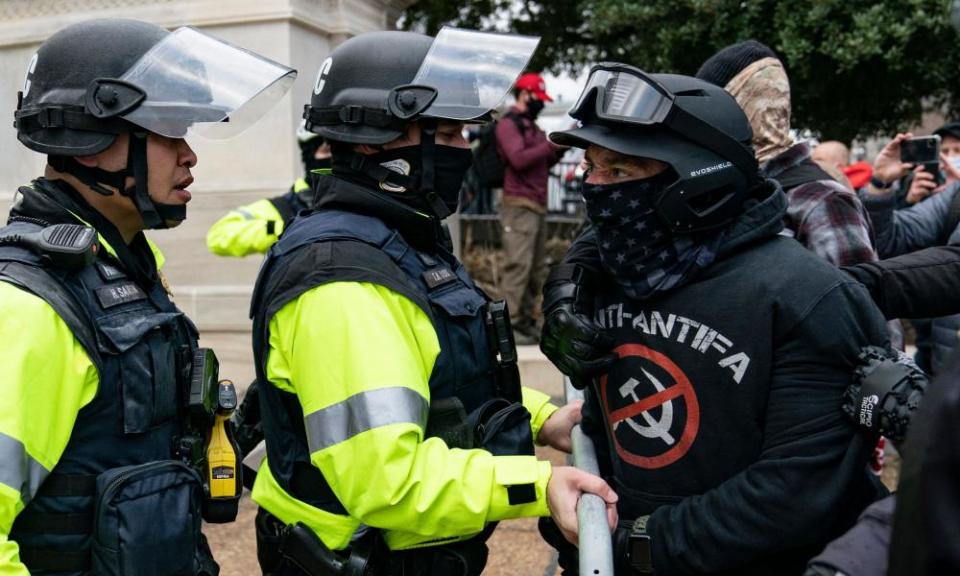First Thing: US and UK battle to contain backlash to Aukus pact
Good morning.
The US and Britain are battling to contain an international backlash over a nuclear submarine pact struck with Australia amid concerns that the alliance could provoke China and prompt conflict in the Pacific.
The US defence secretary, Lloyd Austin, made clear that the administration had chosen to close ranks with Australia in the face of belligerent Chinese behaviour. He said: “While we seek a constructive results-oriented relationship with [China], we will remain clear-eyed in our view of Beijing’s efforts to undermine the established international order.”
Meanwhile, Taiwan has welcomed support from major allies after a US-Australia ministerial forum pledged stronger ties with the island and the European parliament called for a bilateral trade deal. Beijing has been adopting an increasingly aggressive stance towards Taipei, which has long received military support from the US.
What is the Aukus agreement? The US and UK have pledged to share sensitive technology with Australia to let it develop its first nuclear-powered submarines.
How has China reacted? China’s foreign ministry spokesperson, Zhao Lijian accused the three partners of engaging in an “obsolete cold war zero-sum mentality”.
What did Taiwan say? Taiwan’s ministry of foreign affairs “sincerely thanked” the US and Australia for their “firm and open” support.
Facebook steps up fight against climate misinformation – but critics say effort falls short

Facebook has announced new efforts to combat climate crisis misinformation on its platform, including by expanding its climate science center to provide more reliable information, investing in organizations that fight misinformation, and launching a video series to highlight young climate advocates on Facebook and Instagram.
But critics say the new push, announced on Thursday, falls short and will allow vast amounts of climate misinformation to slip through the cracks.
Facebook has long been criticized for allowing misinformation about the climate crisis to proliferate on its platform. Mark Zuckerberg, the chief executive, admitted in a 2021 April congressional hearing that climate misinformation is “a big issue”. In the past, the company has said such misinformation accounts for “a very low percentage of total misinformation on the service” but declined to share figures.
The climate denial watchdog group InfluenceMap found dozens of climate denial ads had been viewed more than 8m times after slipping through the social network’s filters.
One recent study conducted by Friends of the Earth, an environmental organization, found about 99% of climate misinformation about the February 2021 power outages in Texas went unchecked.
Facebook has rejected the study’s findings, calling its characterization “misleading”.
Far-right groups tell supporters planned Washington rally is a government ‘trap’

Extremist groups and prominent rightwing figures are warning supporters not to attend a far-right rally in support of the people arrested for participating in the 6 January Capitol attack, calling the event a “false flag” and a “trap”.
Capitol police are bracing for potential violence at the “Justice for J6” protest rally, which is taking place in Washington DC on Saturday, and security fencing has gone up once more around the Capitol building.
But local and federal officials have also said that they expect no more than 700 people to attend the protest, a far cry from the estimated tens of thousands of supporters of Donald Trump who converged on the Capitol in January.
Across rightwing social media platforms, “most people who are talking about the event in any capacity are telling people to steer clear of DC”, Cassie Miller, a senior research analyst at the Southern Poverty Law Center, said.
Who is organizing the rally? It’s being organized by Look Ahead America, a group run by Matt Braynard, who was briefly employed by Trump’s 2016 presidential campaign
World’s largest tree wrapped in fire-resistant blanket as California blaze creeps closer
Firefighters have wrapped the base of the world’s largest tree in a fire-resistant blanket as they tried to save a famous grove of gigantic old-growth sequoias from wildfires burning in California’s rugged Sierra Nevada.
The colossal General Sherman tree in Sequoia national park’s giant forest, some of the other sequoias, the Giant Forest Museum and other buildings were wrapped as protection against the possibility of intense flames, fire spokesperson Rebecca Paterson said.
The aluminium wrapping can withstand intensive heat for short periods. Federal officials say they have been using the material for several years throughout the US west to protect sensitive structures from flames. Homes near Lake Tahoe that were wrapped in protective material survived while others nearby were destroyed.
Scientists say climate change has made the region much warmer and drier in the past 30 years and will continue to make weather more extreme and wildfires more frequent and destructive.
In other news …

US congressional investigators say they have uncovered “very concerning” new documents about ExxonMobil’s disinformation campaign to discredit climate science. Representative Ro Khanna said the documents were “troubling”.
Academics of color are being targeted by the Professor Watchlist, an online list of academics curated by the rightwing Turning Point USA (TPUSA) group, a powerful supporter of Donald Trump and his Republican party allies.
A single bitcoin transaction generates the same amount of electronic waste as throwing two iPhones in the bin, according to a new analysis by economists from the Dutch central bank and MIT, which highlights the vast churn in computer hardware that the cryptocurrency incentivises.
Simone Biles offered emotional testimony at a US senate hearing on Tuesday into the Larry Nassar abuse scandal, an episode that rocked the world of gymnastics and involved some of the most famous young athletes in America.
Don’t miss this: Genesis on prog, 80s stardom and Phil Collins’s health
“Below the radar” may be a strange way of describing a band who have sold more than 150m albums. But, then, Genesis have always been peculiarly self-effacing. From their early-70s, Peter Gabriel-fronted iteration, where they quickly ascended from progressive rock to their staggeringly successful 80s years, they remain a wildly popular – yet pleasingly eccentric – proposition. But how, exactly, did Genesis move from being titans of prog – famed for 20-minute epics, lofty concept suites and bizarre costume changes – to stadium-filling 80s everyman popsters?
Climate check: Humans are encroaching on grizzly territory. Can we live together?
A fatal encounter with a grizzly bear, or any bear, is exceptionally rare but in Montana the recent killing of 65-year-old camper Leah Davis Lokan is seen as further evidence that a burgeoning and spreading grizzly population, aided by four decades of federal protection, is now increasingly bumping up against residents and visitors of the US west. The number of bears is increasing as the human population in bear strongholds in south-west Montana has escalated by up to a third over the past decade. The two species now share more mutual startled gawps and more conflicts.
Want more environmental stories delivered to your inbox? Sign up to our Green Light newsletter to get the good, bad and essential news on the climate every week
Last thing: Message in a bottle from Japan washes up on Hawaii beach after 37 years

A glass bottle that was released into the sea 37 years ago by high school students in Japan has been found on the island of Hawaii, about 6,000km away. Students of the natural science club at Choshi high school in the eastern prefecture of Chiba released the bottle in 1984 as part of a project to investigate ocean currents, Japanese newspaper Mainichi reported. At a briefing on 15 September about the discovery, the school’s vice-principal Jun Hayashi said: “We thought the last one was found in Kikaijima. We never imagined another would be found 37 years on.”
Sign up
First Thing is delivered to thousands of inboxes every weekday. If you’re not already signed up, subscribe now.
Get in touch
If you have any questions or comments about any of our newsletters please email newsletters@theguardian.com

 Yahoo News
Yahoo News 